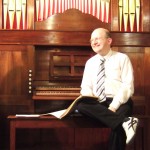The 1066 Choir & Organ President’s Evening was celebrated by a large audience and an equally large number of local musicians at Sackville Road Methodist Church in Bexhill on 27 April.
Stephen had again worked his considerable skill to bring together choirs and soloists in a wide range of music, focussing on the sacred but drawing in many works which now comfortably fit within that category.
After a brief but warm welcome to all, the evening opened with a rousing rendition of All people that on Earth do dwell. Having so many choristers among the audience really got proceedings off with a bang.
Unfortunately Andrew McGreggor was unable to play and Stephen opened the solo pieces with Bach’s Liebster jesu, wir sind hier BWV 633 from the Orgelbuchlein, its gentle tones being a suitable antidote to the fire of the Old One-Hundreth.
Some sleight of hand on the part of the host brought Lin Westcott next to sing Oh heart melt in weeping from Bach’s St John Passion, its lovely lines setting a tone of reflection.
John Pembery both conducted and played for the Melodians, opening with the ancient Greek Hymn Hail gladdening light, followed by Simple Gifts, perhaps better know to us through Sydney Carter as Lord of the Dance. The 23rd Psalm sneaked in under Howard Goodall’s familiar version used in The Vicar of Dibley and the set concluded with Seize the day – a fine chorus from a little known Disney film.
Stephen followed this in triumphal mood with Karg-Elert’s Chorale-Improvisation on Nun danket alle Gott. We know this was used at a royal wedding, but in conversations over tea afterwards nobody could recall quite which one. Suggestions welcome! It is worth pointing out here that Stephen was working against the odds with the organ which, though it sounds magnificent at full tilt, was in fact showing its age and weaknesses throughout, complaining at times and thus needing a large amount of TLC from the performer. Such is professionalism.
Calvert Memorial Methodist Church Choir under the careful guidance of Heather White, and accompanied by Karen Woods, sang four anthems in regular use in their own church, opening with How can I keep from singing? followed by a delightful Silesian arrangement of Fairest Lord Jesus. An attractively romantic setting of Day by day by D Catherwood, which I admit I did not know but would like to know better, led to a setting by Roger Jones of O love that will not let me go
Edward Preston is no stranger to these occasions and pleased all with a moving rendition of Sullivan’s The Lost chord. One would think that Edward would make an unusual Mario Lanza but his singing of I’ll walk with God was deeply moving and impeccably musical.
Returning to the organ Stephen Page played Francis Jackson’s Prelude on East Acklam – a gentle moment of respite before the following choral items.
A small group of singers from King’s Church, led by Claire Burford, sang Graham Kendrick’s Have you heard? and From the highest of heights, a delicate and moving setting by C Tomlin.
The final choral items came from the Regency Singers directed by Stephen Page and accompanied by Andrew Daniels. The four works focussed on the cross-over today between secular and sacred music, opening with You Raise Me Up which has become almost as familiar in church as on the pop scene. Michael Jackson seemed an unlikely bed-follow with Mozart, but linking Heal the World and Ave Verum Corpus made both musical and emotional sense. They ended with Bring him home, Jean Val-Jean’s prayer from Les Miserables, at once popular, reflective and completely modern. What better way to bring the evening to a close?
Well perhaps another hymn for all to enjoy, in this case Stanford’s uplifting When in our music God is glorified. The minister closed with thanks and prayers before we were ushered into the hall for refreshments, via the bucket collection for St Michael’s Hospice.
Another fine evening, with far better weather than this time last year, and another success for President Stephen Page and 1066 Choir & Organ. BH




